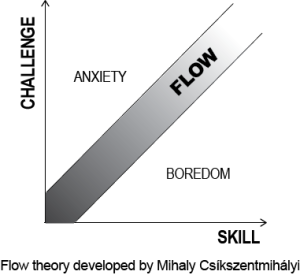

To learn more about how flow, happiness, spirituality, or positive psychology come together, I recommend reading my book Optimal Happiness, or attending our online course Happiness Today & Forever.There is no one-size-fits-all for chronic pain management. Yes, we can learn about flow, but if we really want to understand happiness, spirituality, or positive psychology, we should dig deeper. In other words, we can learn a lot from flow, but we shouldn’t fool ourselves into believing that it is the puzzle, or even that it is a substantial piece of the puzzle. This last step is very important since in my experience flow is just a piece of a bigger puzzle, which is spirituality and happiness. However, I will still state that everyone who mentions Mihaly Csikszentmihalyi and flow should also give credit to Hinduism, Buddhism, and many other spiritual or otherwise practices that have flow at their core.

Yet, in my opinion, he doesn’t give this enough credit as we are still left with the impression that despite confirming this known information, somehow Mihaly Csikszentmihalyi invented the flow finally introducing this unique and never heard concept to the general public.Īnd while I am overly critical of Mihaly Csikszentmihalyi and flow, I can’t dismiss that Mihaly Csikszentmihalyi is a powerhouse in the world of positive psychology, teaching and inspiring generations of people to become better and happier human beings. This is still important, but flow is still super-hyped, for a bad reason, which is the historic rejection of any spiritual and religious contributions in the hands of science.Ĭsikszentmihalyi himself confesses to doing pretty much that in his book Flow: The Psychology of Optimal Experience. In this way, the real contribution of Csikszentmihalyi is to use scientific tools to confirm what we already know. Indeed, we can trace back to the real origins of flow dating back to around 5,000 BC (if not earlier), with the invention of Hinduism, and later Buddhism, where you can find flow in the center of these religious and spiritual practices.įor example, in Buddhism, flow is often described as a byproduct of mediation, mindfulness, and simply being in the now, which eventually leads to enlightenment.

However, despite the super-hype that exists around flow, I am also certain that Mihaly Csikszentmihalyi did NOT invent flow and rather borrowed it from a several thousand year tradition, giving it a scientific twist. Indeed, reading Csikszentmihalyi’s wikipedia page, I can’t help but notice that the concept of flow strand at the center of Csikszentmihalyi’s contribution to this field of studies, even earning him a title of father of positive psychology and many other honors associated with this title. It is impossible to read a book on positive psychology without hearing of flow and its inventor, Mihaly Csikszentmihalyi.


 0 kommentar(er)
0 kommentar(er)
